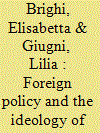|
|
|
Sort Order |
|
|
|
Items / Page
|
|
|
|
|
|
|
| Srl | Item |
| 1 |
ID:
144732


|
|
|
|
|
| Summary/Abstract |
The post-communist Italian Left has experienced a long phase of ideational misalignment between ideas placed at different levels, as a qualified discursive institutionalist approach demonstrates. Background public philosophies have often clashed with post-communist political ideology, while foreign policy programmes have often contradicted specific policies. Under the leadership of Matteo Renzi, however, the PD is now experiencing a moment of remarkable ideational consistency. Rather than being founded on entirely new premises, this new consensus folds old elements into new ones and shows all the defining traits of post-ideology. Yet, by espousing post-ideology, Renzi is making an ultimately ideological move whose limitations may soon start to show.
|
|
|
|
|
|
|
|
|
|
|
|
|
|
|
|
| 2 |
ID:
145980


|
|
|
|
|
| Summary/Abstract |
Through the lenses of contemporary terrorism, this article charts the rise of global resentment against the background of the multiplication and denial of failure. The article examines resentment and ressentiment as emotional responses to different kinds of failure: failure of justice and failure of recognition, respectively. It then investigates their place in the affective and moral economy of the global age, teasing out the key distinctions between the two emotions and assessing the strengths of the claim concerning an ever expanding diffusion of ressentiment in late modern times. Through inroads into classical and contemporary political theory, the article seeks to rescue resentment from the relative hegemony of ressentiment. The article closes with a reading of the Paris terror attacks of 7 January 2015 and 13 November 2015, that seeks to disentangle the different forms of resentment mobilised in these acts. By raising the issue of the moral value of resentment, the article ultimately seeks to address the question of how to cope with failure while holding on to emancipatory, counter-hegemonic, and self-affirming political practices.
|
|
|
|
|
|
|
|
|
|
|
|
|
|
|
|
| 3 |
ID:
108907


|
|
|
|
|
| Publication |
2011.
|
| Summary/Abstract |
The revival of geopolitics in post-1989 Italy is at once a rather straightforward and perplexing matter. On the one hand, the renewed appeal that geopolitical thinking has enjoyed in International Relations (IR) circles has been well documented and could hardly be downplayed. On the other hand, however, the recourse to geopolitics has often boiled down to an undifferentiated and often convoluted use of its terms, approaches and theories. In this article we argue that the rationale of such a revival has been less to import geopolitical knowledge into IR and more to confer legitimacy and respectability to the analyses put forward by scholars and practitioners. It is no chance, in fact, that the geopolitics-inspired academic discourse has been progressively recognised as a way, if not the way, to discuss international affairs in post-1989 Italy. The central puzzle to be investigated behind the revival of geopolitics in Italy is thus how such a discourse has managed to gain and retain a powerful status in Italian IR academia and, most importantly, why.
|
|
|
|
|
|
|
|
|
|
|
|
|
|
|
|
|
|
|
|
|